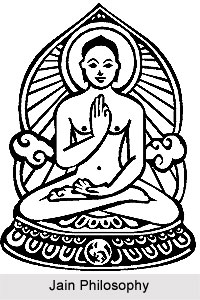 Karma according to the Jainism is of material nature or paudgalika. The Jains conceive that that thoughts and ideas affect the character of individuals and create or modify the tendencies of their souls. Karma is a substantive force, matter in a subtle form. The kind of matter fit to manifest karma fills all cosmic space. It has the peculiar property of developing the effects of merit and demerit. The soul by its commerce with the outer world becomes literally penetrated with the particles of subtle matter. These become karma and build up a special body called karmanasarira, which does not leave the soul till its final emancipation. This karmic matter retards the radiance of the soul.
Karma according to the Jainism is of material nature or paudgalika. The Jains conceive that that thoughts and ideas affect the character of individuals and create or modify the tendencies of their souls. Karma is a substantive force, matter in a subtle form. The kind of matter fit to manifest karma fills all cosmic space. It has the peculiar property of developing the effects of merit and demerit. The soul by its commerce with the outer world becomes literally penetrated with the particles of subtle matter. These become karma and build up a special body called karmanasarira, which does not leave the soul till its final emancipation. This karmic matter retards the radiance of the soul.
Bhavakarma is immediate to the jivas, while dravyakarma belongs to the body. The two are associated together, though they are distinct and separate as the conscious or chetna and the non-conscious or achetana. Karma works in such a way that every change which takes place leaves a mark which is retained and built into the organism to serve as the foundation for future action. It is there actual and acting in the nature of the jivas.
The five classes of karmic conditions that are mentioned determine a mental condition or bhava corresponding to it. On account of the rise, suppression, annihilation, mixed suppression or unconditioned thought, the jiva has five bhavas or thought conditions. The last is unconditioned by karma, while the four others are conditioned by changes on the physical side. In the usual course of things karma takes effect and produces its proper results.
Soul under the Influence of Karma
The soul according to the Jain Philosophy is said to be in the Audayika state. By proper effort karma may be prevented from taking effect for some time. Though it is neutralised, it is still present, like fire covered by ashes. The soul is then said to be in the Aupasamika state. When karma is not only prevented from working, but is annihilated altogether, then the soul is in the Ksayika state which leads to Moksha. There is a fourth state of the soul, Ksayopasamika, which partakes of the nature of all the preceding ones. In this condition some karma is annihilated, some are neutralised and some are active. It is the state of those whom one can call well, while the Ksayika and Aupasamika states belong to those of holy men.
Except in final release the soul is always in connection with matter, the link between the two being karma.
Classification of Karma
There are mainly two classifications of Karma, Destructive and Non-destructive karma. Destructive karma is to get bound with the soul and destroy its natural qualities. Non-destructive karma does not harm the main qualities of the soul. These have been further sub-divided into various categories.
Types of Karma
Karma has been broadly classified into the following eight categories
* Mohniya karma
* Gyan varaniya karma
* Darasna varaniya karma
* Antaraya karma
* Vedniya karma
* Nama karrna
* Gotra karma
* Ayu karma
The first four karmas are called Ghati karmas because they obscure the natural qualities of the soul. The last four karmas are known as Aghati karmas because they don`t affect the qualities of the soul.



















